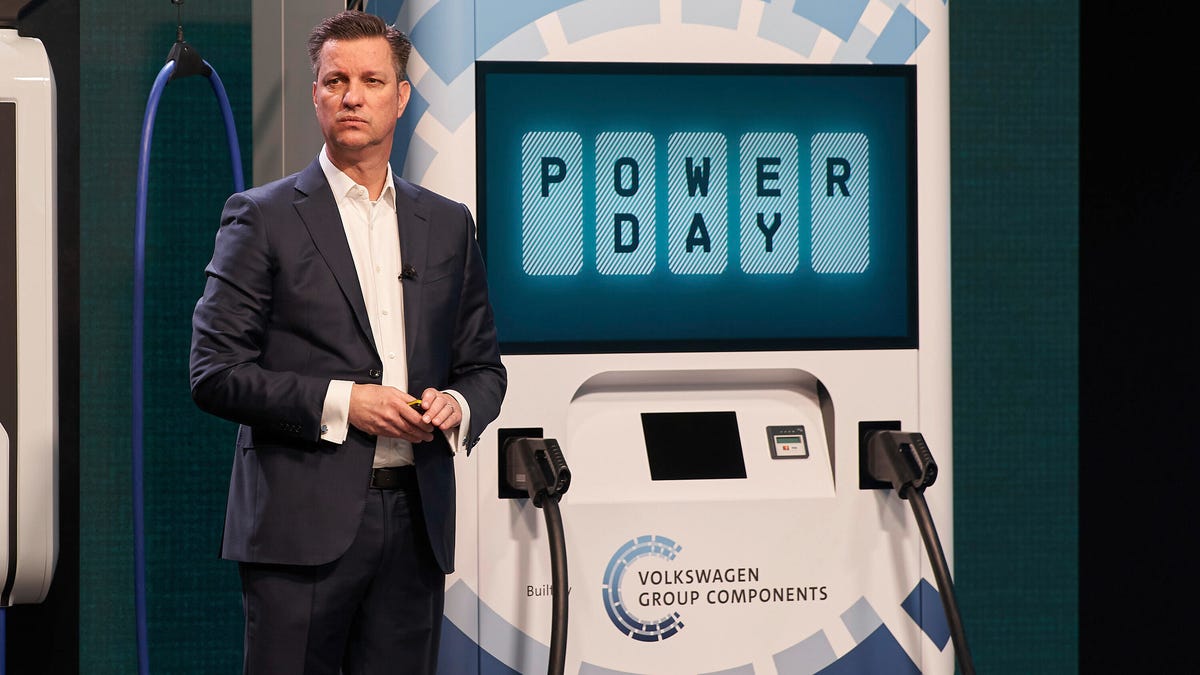VW outlines next-gen battery and charger plans at Tesla-like Power Day
Volkswagen is developing solid-state batteries and two-way charging, plus it's building six gigafactories and expanding its global charging network.
Taking a page from Elon Musk and Tesla's playbook, on Monday, Volkswagen Group executives outlined the company's next-generation battery and charging strategy in its first Power Day presentation, a virtual seminar. The German giant detailed plans to move a majority of its forthcoming electric vehicle range to a single next-generation battery format.
Dubbed "Unified Battery Cell," this new prismatic (as opposed a to cylindrical or pouch-style) format will enter production in 2023 and go on to form the heart of 80% of the company's EVs by 2030. The remaining 20% of production will rely on special chemistries for unique usage cases, including heavy-duty commercial trucks and high-performance models and race cars among them. There is a clear, distinct target for Porsche's own research and development within VWAG: "Our goal must be to ensure a permanent supply of high-performance cells that fully satisfy our specific requirements for future electrified race cars and electric super sports cars," said Porsche CEO Oliver Blume.
VW's goal is to cut battery costs by up to 50% in these standard cells, and to ensure up to 95% recyclability, all while increasing range. According to a press release, "Volkswagen intends to gradually reduce the cost of batteries in the entry-level segment by up to 50% and in the volume segment by up to 30%." As noted by Reuters, it's not immediately clear what this largely in-house program means for the Volkswagen Group's existing pouch-style battery partners, which include Korea's LG and SK Innovation.
VW officials outlined plans for 240 gigawatt hours of battery capacity in six European factories by the end of this decade, including 40 gigawatt-hour plants in Skelleftea, Sweden (coming online in 2023), and in Salzgitter, Germany, in 2025.
Consumers will first be able to experience this next-gen battery power in the company's forthcoming Artemis platform, which is now in development at Audi, another of VWAG's luxury brands.
Bidirectional charging
Beginning in 2022, VW says models built on the company's MEB architecture will support bidirectional (two-way) charging -- that is, the ability to leverage a vehicle's battery to power external things. That ability includes feeding power back into a home or business in the event of a blackout, or to use as a temporary storage medium to take advantage of lower-cost off-peak electricity rates. Plans call for VW to offer a home energy storage battery to take advantage of this new capability (think: Tesla PowerWall). It is not immediately clear if this two-way capability will be legal throughout the US and Canada -- other automakers have announced similar capabilities, only to run into local regulatory red tape.
Solid-state battery future
During Power Day, VW also confirmed plans to continue pursuing solid-state batteries as its end goal, and the company says that moving to this newly standardized Unified Battery Cell as an intermediate step will help the company's models move to a liquid-free battery easier in the future. VW is working with its US partner QuantumScape to ready production of solid-state cells for the 2025 timeframe.
Volkswagen believes these smaller, lighter and more robust liquid-free cells will enable up to 30% more range while delivering 80% charges in as little as 12 minutes. That's roughly twice as quick as today's cutting-edge batteries, which would bring refueling time much closer to parity with gasoline-powered vehicles. Lengthy charge times are seen as a primary stumbling block to EV adoption by many consumers.
Charging network plans
Volkswagen also revealed plans to ramp up its European charging network to 18,000 charge points in the near term -- a quintupling of today's footprint -- with partners like BP in the UK, Iberdrola in Spain and Enel in Italy. VW is planning 8,000 150kW high-speed chargers at BP and Aral gas stations, primarily in Germany and the UK. In the US, plans call for 3,500 new fast-charging locations by 2023, and a further 17,000 charge points in China by 2025. Electrify America, the company's US charging arm, says it is averaging four new network-point installations per week, and it expects to have 800 stations up and running in North America by the end of 2021.
In the near term, on the back of its new ID range of EV models that are just now entering dealers worldwide, Volkswagen expects to double global battery electric vehicle sales to become between 6 and 8% of the company's range of vehicles. The first of these models to be offered in the US and Canada is the ID 4 compact crossover.


